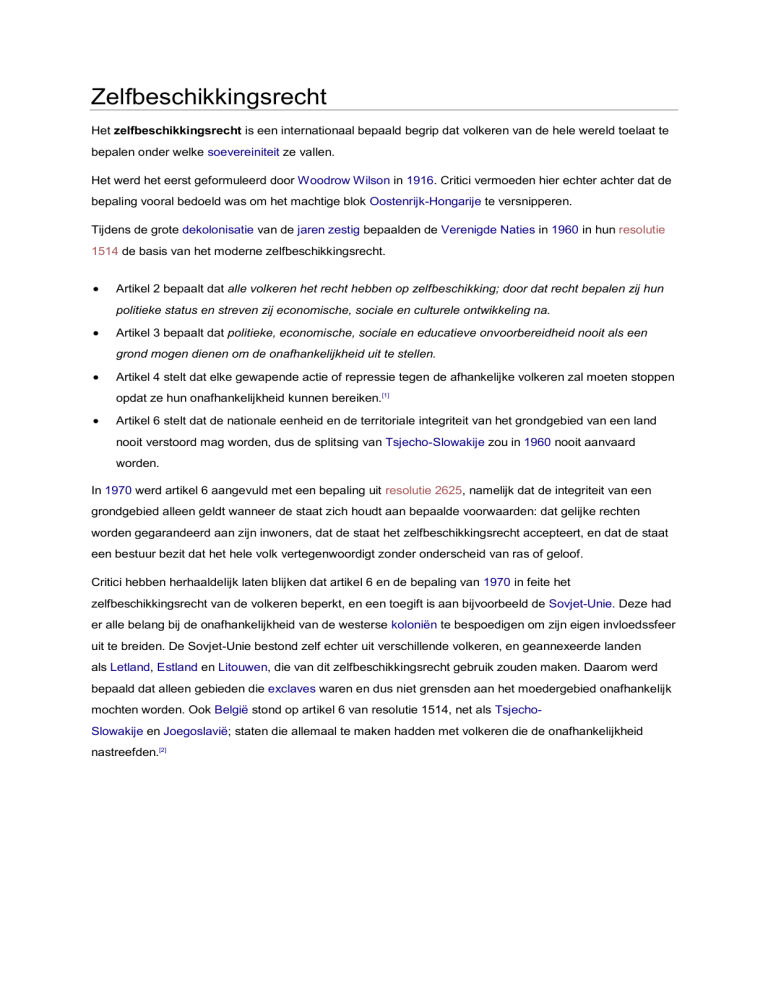
Zelfbeschikkingsrecht
Het zelfbeschikkingsrecht is een internationaal bepaald begrip dat volkeren van de hele wereld toelaat te
bepalen onder welke soevereiniteit ze vallen.
Het werd het eerst geformuleerd door Woodrow Wilson in 1916. Critici vermoeden hier echter achter dat de
bepaling vooral bedoeld was om het machtige blok Oostenrijk-Hongarije te versnipperen.
Tijdens de grote dekolonisatie van de jaren zestig bepaalden de Verenigde Naties in 1960 in hun resolutie
1514 de basis van het moderne zelfbeschikkingsrecht.
Artikel 2 bepaalt dat alle volkeren het recht hebben op zelfbeschikking; door dat recht bepalen zij hun
politieke status en streven zij economische, sociale en culturele ontwikkeling na.
Artikel 3 bepaalt dat politieke, economische, sociale en educatieve onvoorbereidheid nooit als een
grond mogen dienen om de onafhankelijkheid uit te stellen.
Artikel 4 stelt dat elke gewapende actie of repressie tegen de afhankelijke volkeren zal moeten stoppen
opdat ze hun onafhankelijkheid kunnen bereiken.[1]
Artikel 6 stelt dat de nationale eenheid en de territoriale integriteit van het grondgebied van een land
nooit verstoord mag worden, dus de splitsing van Tsjecho-Slowakije zou in 1960 nooit aanvaard
worden.
In 1970 werd artikel 6 aangevuld met een bepaling uit resolutie 2625, namelijk dat de integriteit van een
grondgebied alleen geldt wanneer de staat zich houdt aan bepaalde voorwaarden: dat gelijke rechten
worden gegarandeerd aan zijn inwoners, dat de staat het zelfbeschikkingsrecht accepteert, en dat de staat
een bestuur bezit dat het hele volk vertegenwoordigt zonder onderscheid van ras of geloof.
Critici hebben herhaaldelijk laten blijken dat artikel 6 en de bepaling van 1970 in feite het
zelfbeschikkingsrecht van de volkeren beperkt, en een toegift is aan bijvoorbeeld de Sovjet-Unie. Deze had
er alle belang bij de onafhankelijkheid van de westerse koloniën te bespoedigen om zijn eigen invloedssfeer
uit te breiden. De Sovjet-Unie bestond zelf echter uit verschillende volkeren, en geannexeerde landen
als Letland, Estland en Litouwen, die van dit zelfbeschikkingsrecht gebruik zouden maken. Daarom werd
bepaald dat alleen gebieden die exclaves waren en dus niet grensden aan het moedergebied onafhankelijk
mochten worden. Ook België stond op artikel 6 van resolutie 1514, net als TsjechoSlowakije en Joegoslavië; staten die allemaal te maken hadden met volkeren die de onafhankelijkheid
nastreefden.[2]
Onder de link Resolutie 1514 van de VN staat het volgende:
Resolution 1514 (2003)
Adopted by the Security Council at its 4857th meeting,
on 13 November 2003
The Security Council,
Reaffirming its previous resolutions concerning Côte d’Ivoire, in particular its
resolution 1479 (2003) of 13 May 2003 which authorized the establishment of a
special political mission in Côte d’Ivoire as confirmed in the letter of the Security
Council President to the Secretary-General (A/58/535), and its resolutions 1464
(2003) of 4 February 2003 and 1498 (2003) of 4 August 2003,
Having considered the report of the Secretary-General of 4 November 2003
(S/2003/1069),
Reaffirming its strong commitment to the sovereignty, independence, territorial
integrity and unity of Côte d’Ivoire and reaffirming also its opposition to any
attempts to take power by unconstitutional means,
Reaffirming also its endorsement of the agreement signed by the Ivorian
political forces at Linas-Marcoussis on 24 January 2003 (S/2003/99) (“LinasMarcoussis Agreement”),
approved by the Conference of Heads of State on Côte
d’Ivoire held in Paris on 25 and 26 January,
Stressing the urgent need for all parties to participate fully in the Government
of National Reconciliation so as to enable it to implement fully all the provisions of
the Linas-Marcoussis Agreement,
Stressing also the importance of the commitment of the Government of
National Reconciliation to resume effective administration throughout Côte d’Ivoire
and reminding all Ivorian parties of their obligation to contribute positively thereto,
Reaffirming the need for the Government of National Reconciliation to commit
itself fully and immediately to the Disarmament, Demobilization and Reintegration
programme (DDR), including the dismantling of militias, and to the restructuring of
the armed forces,
Recalling the importance of the principles of good-neighbourliness, noninterference and cooperation
in the relations between States of the region,
Further recalling its full support for the efforts of the Economic Community of
West African States (ECOWAS) and France to promote a peaceful settlement of the
conflict,
Noting the continued need for MINUCI in accordance with its resolution 1479
(2003),
Noting with concern the continued existence of challenges to the stability of
Côte d’Ivoire and determining that the situation in Côte d’Ivoire continues to
constitute a threat to international peace and security in the region,
1. Decides that the mandate of the United Nations special political mission
in Côte d’Ivoire, MINUCI, shall be extended until 4 February 2004;
2. Requests the Secretary-General to report to the Security Council by 10
January 2004 on MINUCI’s efforts to facilitate peace and stability in Côte d’Ivoire,
including how those efforts might be improved and in particular the possible
reinforcement of the United Nations presence in Côte d’Ivoire;
3. Decides to remain actively seized of the matter










